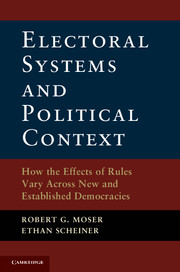 Electoral Systems and Political Context
Electoral Systems and Political Context Book contents
- Frontmatter
- Contents
- Tables and Figures
- Abbreviations
- Glossary of Key Terms
- Acknowledgments and Note on the Online Appendix
- Introduction
- 1 When Do the Effects of Electoral Systems Diverge from Our Expectations?
- 2 Mixed-Member Electoral Systems
- 3 How Democratic Experience and Party System Development Condition the Effects of Electoral Rules on Disproportionality and the Number of Parties
- 4 How Democratic Experience and Party System Development Condition the Effects of Electoral Rules on Disproportionality and the Number of Parties
- 5 Political Context, Electoral Rules, and Their Effects on Strategic and Personal Voting
- 6 How Democratic Experience and Party System Development Condition the Effect of Electoral Rules on Strategic Defection
- 7 Social Diversity, Electoral Rules, and the Number of Parties
- 8 How Political Context Shapes the Effect of Electoral Rules on Women's Representation
- 9 Conclusion
- References
- Index
6 - How Democratic Experience and Party System Development Condition the Effect of Electoral Rules on Strategic Defection
Published online by Cambridge University Press: 05 November 2012
- Frontmatter
- Contents
- Tables and Figures
- Abbreviations
- Glossary of Key Terms
- Acknowledgments and Note on the Online Appendix
- Introduction
- 1 When Do the Effects of Electoral Systems Diverge from Our Expectations?
- 2 Mixed-Member Electoral Systems
- 3 How Democratic Experience and Party System Development Condition the Effects of Electoral Rules on Disproportionality and the Number of Parties
- 4 How Democratic Experience and Party System Development Condition the Effects of Electoral Rules on Disproportionality and the Number of Parties
- 5 Political Context, Electoral Rules, and Their Effects on Strategic and Personal Voting
- 6 How Democratic Experience and Party System Development Condition the Effect of Electoral Rules on Strategic Defection
- 7 Social Diversity, Electoral Rules, and the Number of Parties
- 8 How Political Context Shapes the Effect of Electoral Rules on Women's Representation
- 9 Conclusion
- References
- Index
Summary
In Chapter 4, we showed that there is significant variation in the number of parties under different electoral rules and political contexts, but we did not demonstrate the mechanisms – such as strategic defection by voters and elites – that underpin the different results we found. In Chapter 5, we began to show how rules and context shape strategic defection by voters under SMD rules, but the existence of a “personal” vote often obscured our view of much of the strategic voting that probably did occur. In this chapter, we introduce a different approach, which we use to highlight more directly how political context – most notably, democratic experience and party system development – conditions the impact of SMD rules on strategic defection in mixed-member electoral systems.
Specifically, we use Cox's (e.g., 1997) “SF ratio” measure (usually the vote total of the third-place contestant [the “Second loser”] divided by the vote total of the second-place contestant [the “First loser’]) to help draw inferences about strategic defection under particular electoral rules. As we do throughout this book, we use mixed-member systems to gain analytical leverage on electoral system effects. In this chapter we examine patterns of strategic defection in mixed-member systems in 41 elections in 11 different countries, considering how SF ratio patterns within a given country differ between the SMD and PR tiers of mixed-member systems. We show how SF ratio patterns in SMDs – unlike those in PR – often highlight the presence of strategic behavior, presumably because many voters and elites, when facing a competitive district race, transfer their support from candidates/parties who are unlikely to win to one of the top two contestants.
- Type
- Chapter
- Information
- Electoral Systems and Political ContextHow the Effects of Rules Vary Across New and Established Democracies, pp. 149 - 179Publisher: Cambridge University PressPrint publication year: 2012


